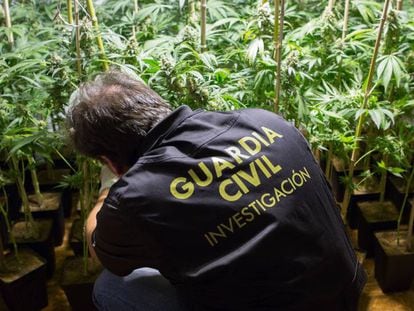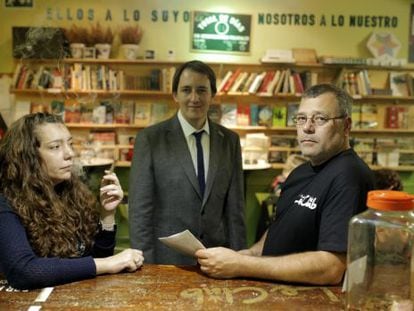The entrepreneurs planting the seeds to make a million from legal marijuana
A key legalization vote in California in November could unleash a green gold rush

For the last three years, Dan Humiston has been organizing a sizeable trade fair in New York and Los Angeles. Like other such events, the buzz is created by talk about legislation and marketing, and there’s a vibrant exchange of ideas, among the 100 stands and hundreds of potential investors sizing up the different products.
But there’s something missing at this fair, because the product it is all about, marijuana, is nowhere to be seen: it’s illegal. But the World Cannabis Congress is a step ahead of the game, preparing business people and investors for the moment it is legalized and the green gold rush begins.
The main argument for legalizing cannabis is to bring a huge and unregulated industry into the open
“The cannabis industry in America is taking off,” says Humiston at the LA conference. “Doors have been opened and entrepreneurs are positioning themselves in many different areas. This is the time to get in on it; it’s a once-in-a-lifetime thing. It’s an emerging industry that needs people and business.”
The gradual legalization of marijuana use in the United States, initially for medicinal applications, and increasingly as a recreational legal high, is creating an economic ecosystem around a plant the cultivation of which is still outlawed by the federal government. At present, 26 states allow the medicinal use of marijuana, which consumers can only buy with a prescription. Three more states are about to vote on whether to join them.
Then there are four states – Washington, Oregon, Alaska and Colorado – which allow recreational use, making it into a taxed product like any other in a regulated market. A vote to establish similar status for the drug in five other states is scheduled to coincide with the presidential elections this November. The most influential of these is California, which, according to surveys, looks as though it will vote for complete legalization. According to experts, California will be the tipping point.
“California forced the Federal Government to bring the issue to a vote,” says Humiston.

Despite voting against a similar measure in 2010, surveys now show landslide support for legalization, and politicians are even altering laws in anticipation.
The main argument for legalizing cannabis is to bring a mammoth industry that is almost impossible to police into the open once and for all. The fiscal benefits of doing so are worth hundreds of millions of dollars a year, according to advocates of legalization in California. Last year, Colorado scooped up $135 million in taxes on cannabis, 77% more than it collected in 2014 and double what it made from alcohol. And while Colorado has a population of five million, California has 38 million residents.
Market researchers Arcview estimate that legal sales last year across the country were worth $5.7 billion. Nobody knows how much this will be once the illegal market is incorporated into the equation, but the prospect is generating a frenzy for the so-called green gold.
At the LA trade fair, dozens of people flocked to two different seminars, one on how to start your own marijuana business and another on how to invest in the sector. Meanwhile, stands advertised anything from cannabis cosmetics to hemp bags, financial services, and legal and marketing advice. Chris Husong, for example, presented a line of products called Elixinol – oils from hemp packaged as dietary products.
The cannabis industry in America is taking off. This is the time to get in on it
Dan Humiston, entrepreneur
Husong’s company takes great care with the way he packages his product because of the stigma still attached to the drug.
Meanwhile, Avis Bulbuyan was offering marijuana business consultations under the name SIVA. He explained that an investment of $200,000 to $300,000 is enough to set up an outlet with an average return of 40%. But he does recognize that the illegal status of the drug at the federal level complicates things. For example, it’s hard to find banking services – handy in a business which moves huge amounts of cash.
“The more you play by the rules, the less risk you run from the federal authorities,” says Bulbuyan.
His brother Kevin has already developed a line of medicinal marijuana products called Varavo with tasteful packaging. Among them are marijuana vaping capsules. In his opinion, having pharmaceutical packaging is vital for winning customer confidence.
Marijuana is not only in demand from people suffering from cancer: the industry itself is anxious to join the mainstream. The biggest event at the Cannabis World Congress was organized by Montel Williams, a TV personality with the degenerative disease amyotrophic lateral sclerosis, and an important voice for legalization.

Williams takes marijuana daily in various forms and is about to start his own company selling it as a pharmaceutical. As far as he is concerned, the most important aspect of legalization is that doctors and pharmaceutical companies will be able to experiment. Right now, each patient decides how much is good for them and how they take it. “The patients themselves have developed the science,” Williams tells EL PAÍS.
“The industry is already here,” says Dale Jones. “Now we are just waiting for the industry to be legalized.”
Jones is the director of the so-called University of Oaksterdam, a well-known marijuana business school with headquarters in nearby San Francisco whose lectures have informed as many as 25,000 students from 30 countries over the last nine years.
According to Jones, the current moment is like the end of Prohibition, when those who were already in the alcohol business made the most money; those who have a good position in the marijuana industry could be the Jim Beam or Jack Daniels of the new era.
“The first person on the scene could make a lot of money, but could also wind up in prison,” says Jones, referring to the outcome of the November vote.
In the event of a yes, self-styled marijuana queen of Beverly Hills Cheryl Shuman may get her dream of hosting her own television show.
“I want to be the Martha Stewart of marijuana,” she says, talking openly about how she has her own home grow and a celebrity customer base. “It’s the new alcohol.”
English version by Heather Galloway.













































